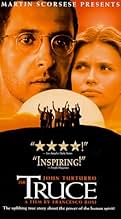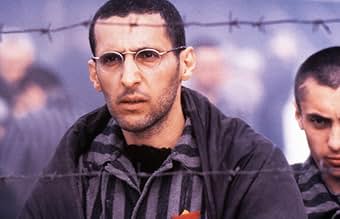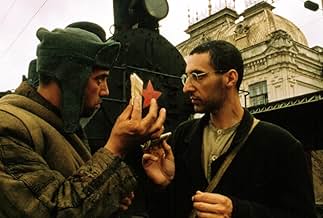CALIFICACIÓN DE IMDb
6.6/10
1.9 k
TU CALIFICACIÓN
Sigue autobiográfica "The Reawakening" de Primo Levi.Sigue autobiográfica "The Reawakening" de Primo Levi.Sigue autobiográfica "The Reawakening" de Primo Levi.
- Dirección
- Guionistas
- Elenco
- Premios
- 7 premios ganados y 9 nominaciones en total
Tatyana Cherkasova
- Irina
- (as Tatyana Meshcherina)
Opiniones destacadas
The Truce is a great movie. Even if this is not your type of movie that you would want to see, the story in itself is terrific. The story of post-holocaust, the close of the 2nd World War in Europe and the prime of Stalin in command is the setting of the movie. The actors bring out the greatness of the story with their colorful and realistic characters. This story, of a kind of Italian band of brothers, trying to get back home is the plot to one of the best movies dealing with redemption in 1945 Europe. Agnieszka Wagner is down right stunning. Although she plays a simple role, it is moments like these, with her on camera that make the movie good. The entire movie is packed with moments of laughter, horror, sweetness and truth. The Truce is a forgotten classic of its genre.
There are books and films. Two different ways of telling a story. Sometimes films are based on books. In that case one does good by not concentrating on the book and see the film as an independent work of art. Barthes already proclaimed 'the death of the writer', the discourse is not a message of the writer. But sometimes it's impossible to ignore the writers' work and his message. This is the case with one of this centuries' most important writers, Primo Levi. He didn't just write books, but was able to put in words his very own experiences in the German Lagers and this way put it in a much broader sense, he wrote history.
Many years before, Rosi had succesfully filmed 'christ stopped at Eboli', which was also based on an autobiography (Carlo Levi, not related to Primo) of the fascist period. Rosi did well not to choose Primo Levi's 'if this is a man' (se questo e un uomo), which describes the unimaginable experiences of Levi in the German Lager, he chose what could be called its' 'sequel'. 'the truce' ('la tregua') in which Levi describes his journey home from the camp in Poland to Turin, Italy, which took him an absurd nine months.The film starts when killingfactory Auschwitz-Birkenau is liberated by the Russians and the survivors are freed and put in trains, not to go home directly, but to be send to other camps. From there the journey continues, by train, by foot, meeting various characters. Levi, played by John Torturro, is a silent man who now and then expresses wise words or memorable sentences, but somehow never really makes you think. It's a man we follow, but doesn't touch us, let alone move us. This is not Turturro's fault, he gives a fairly good performance, but Rosi wants too much tell an important story, forgetting the ones who ARE the story; namely the characters. None of them is very well worked out. Take the Greek Nahum, in the book a surpising, colourful person, here just one-dimensional. Symbolism is overly present; Levi who doesn't want to throw away his campjacket, 'to remember' is credible, but the survivors are faced with german prisoners twice and it's given an unconvincing weight, as one German throws himself on his knees, when he sees Levi and his yellow star of David, far too grotesque. Another unconvincing role is given to the music, it's overly present, even a violin is stolen (where Rosi had this idea from is very unclear??) for no good reason. Music should be on the background.
I am sure Rosi had good intentions, but sometimes it's better to read and reread a book and try to reach as many people as possible in that way.
**out of ***** If this is a man (se questo e un uomo)-primo Levi The truce (La tregua) - Primo levi The saved and the drowned (I sommersi e i salvati)-Primo levi
Many years before, Rosi had succesfully filmed 'christ stopped at Eboli', which was also based on an autobiography (Carlo Levi, not related to Primo) of the fascist period. Rosi did well not to choose Primo Levi's 'if this is a man' (se questo e un uomo), which describes the unimaginable experiences of Levi in the German Lager, he chose what could be called its' 'sequel'. 'the truce' ('la tregua') in which Levi describes his journey home from the camp in Poland to Turin, Italy, which took him an absurd nine months.The film starts when killingfactory Auschwitz-Birkenau is liberated by the Russians and the survivors are freed and put in trains, not to go home directly, but to be send to other camps. From there the journey continues, by train, by foot, meeting various characters. Levi, played by John Torturro, is a silent man who now and then expresses wise words or memorable sentences, but somehow never really makes you think. It's a man we follow, but doesn't touch us, let alone move us. This is not Turturro's fault, he gives a fairly good performance, but Rosi wants too much tell an important story, forgetting the ones who ARE the story; namely the characters. None of them is very well worked out. Take the Greek Nahum, in the book a surpising, colourful person, here just one-dimensional. Symbolism is overly present; Levi who doesn't want to throw away his campjacket, 'to remember' is credible, but the survivors are faced with german prisoners twice and it's given an unconvincing weight, as one German throws himself on his knees, when he sees Levi and his yellow star of David, far too grotesque. Another unconvincing role is given to the music, it's overly present, even a violin is stolen (where Rosi had this idea from is very unclear??) for no good reason. Music should be on the background.
I am sure Rosi had good intentions, but sometimes it's better to read and reread a book and try to reach as many people as possible in that way.
**out of ***** If this is a man (se questo e un uomo)-primo Levi The truce (La tregua) - Primo levi The saved and the drowned (I sommersi e i salvati)-Primo levi
8=G=
"The Truce" chronicles the homeward bound odyssey of an Auschwicz survivor - Primo played by Turturro - in the chaos immediately following the fall of the Third Reich. Although Primo, an Italian Jew, is the central character, the camera spends more time on the people, places, and vicissitudes which he encounters on his journey from Krakow to Turin. This beautifully shot, somber film with an abundance of extras and a minimal core cast has no specific focus. The interest in this film is in the story and the story is in the telling. A very worthy cinematic endeavor.
The movie which held great promise seemed to stop short of coherency. The dialog was hard to understand and the characters never really were fully developed. Some things should be left alone as books. This was one of them.
The broad scope of the book could not be shown and the internal thought processes simply did not make the transition.
The broad scope of the book could not be shown and the internal thought processes simply did not make the transition.
I suppose everyone has seen one or more film representations of The Holocaust, but this one is different. It focuses not on the horror of the events themselves, rather, it's main thrust is struggle to return from the nightmare.
I liked the film for its apparent accuracy in location and the detail of what it was like for some of the Jews liberated from Auschwitz to find their way back to their homelands. Virtually helpless, the Jews in Primo Levi's autobiography embark on an odyssey that eventually gets them back to their homes -- at least some of them. All the more surprising is that Stalin's Soviet Union is their main benefactor throughout all of this. While this is supposed to be an autobiography, I have to wonder at some of the scenes, for example, when the train load of Jews arrives at the Munich main rail station, a former Werhmacht soldier kneels before them. In another, a Jew with barely enough food for himself, gives some bread to German POWs in Russia so that he can watch them fight over it. The irony is unmistakable.
Overall, I liked the film. It's one you have to see more than once because of all the detail. It's a bit difficult to follow the dialog in part, because much of it is in the language of the people who are represented: Poles, Russians, Ukrainians, French, Germans, Italians. Not only that, but the English dialog is accented and somewhat difficult to follow.
I intend to see it at least one or two more times in order to get the full effect of this very well done story.
I liked the film for its apparent accuracy in location and the detail of what it was like for some of the Jews liberated from Auschwitz to find their way back to their homelands. Virtually helpless, the Jews in Primo Levi's autobiography embark on an odyssey that eventually gets them back to their homes -- at least some of them. All the more surprising is that Stalin's Soviet Union is their main benefactor throughout all of this. While this is supposed to be an autobiography, I have to wonder at some of the scenes, for example, when the train load of Jews arrives at the Munich main rail station, a former Werhmacht soldier kneels before them. In another, a Jew with barely enough food for himself, gives some bread to German POWs in Russia so that he can watch them fight over it. The irony is unmistakable.
Overall, I liked the film. It's one you have to see more than once because of all the detail. It's a bit difficult to follow the dialog in part, because much of it is in the language of the people who are represented: Poles, Russians, Ukrainians, French, Germans, Italians. Not only that, but the English dialog is accented and somewhat difficult to follow.
I intend to see it at least one or two more times in order to get the full effect of this very well done story.
¿Sabías que…?
- TriviaFinal film written and directed by Francesco Rosi.
- Citas
[last lines]
Primo Levi: [narrating] You who live secure in your warm houses, who return at evening to find hot food and friendly faces. Consider if this is a man who labors in the mud, who knows no peace, who fights for a crust of bread, who dies at a yes or a no. Meditate that this took place.
- ConexionesFeatured in The Movie Show: Episode dated 19 October 1997 (1997)
- Bandas sonorasMadonina
Written by Giovanni D'Anzi (as G. D'Anzi)
Selecciones populares
Inicia sesión para calificar y agrega a la lista de videos para obtener recomendaciones personalizadas
- How long is The Truce?Con tecnología de Alexa
Detalles
- Fecha de lanzamiento
- Países de origen
- Idiomas
- También se conoce como
- The Truce
- Locaciones de filmación
- Productoras
- Ver más créditos de la compañía en IMDbPro
Taquilla
- Total en EE. UU. y Canadá
- USD 71,448
- Fin de semana de estreno en EE. UU. y Canadá
- USD 23,165
- 26 abr 1998
- Tiempo de ejecución2 horas 5 minutos
- Color
- Mezcla de sonido
- Relación de aspecto
- 1.85 : 1
Contribuir a esta página
Sugiere una edición o agrega el contenido que falta
















